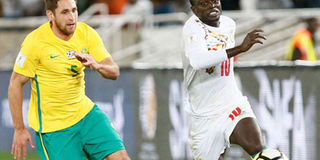Will Pele’s prediction of an African team winning World Cup come true this year?

South Africa's defender Dean Furman (left) fights for the ball with Senegal's midfielder Sadio Mane during their Fifa 2018 World Cup Africa Group D qualifying match at The Peter Mokaba Stadium in Polkowane on November 10, 2017. PHOTO | PHILL MAGAKOE | AFP
What you need to know:
- Continent is represented by five nations that have everything it takes to win the big prize, but the competition is indeed tough and has the usual suspects who go all the way. What is sure, those teams that will not win the tournament are known.
- You have everything it takes to win but you lack the confidence. Our teams are easily intimidated into making mistakes they shouldn’t.
After the sterling performances of Tunisia in 1978, Morocco in 1986 and Cameroon in 1990, O Rei (The King) Pele predicted that an African team was going to win the Fifa World Cup by the year 2000. This year will mark the 18th cycle since the deferment of that outcome.
An African team won’t win the Russia World Cup but I would give the world to be proved wrong. Indeed, if I am, I will voluntarily turn myself over to the Kenya Prisons department and request to do community service for four hours every working day for the rest of my life. Beat that!

From left: Egypt’s Mohamed Salah, Morocco’ Youssef En-Nesyri, Nigeria’s Victor Moses, Sadio Mane of Senegal as well as Tunisia’s Saber Khelifa represented Africa in the 2018 World Cup in Russia. If we don’t find the balance that enables us to conserve nature, we might have a crisis that makes it difficult for us to have African football teams at future World Cups. PHOTOS | AFP
Pele should have been more cautious before making this prediction. Since his retirement, the world’s only three-time World Cup winner has built himself such a poor record that some people have resorted to keeping a tally of his failed predictions.
Brazil’s 2002 World Cup winning coach, Luiz Felipe Scolari once delivered a put-down that reverberated across the world. He said: “I believe Pele knows nothing about football. His analysis always turns out to be wrong. If you want to win a title, you have to listen to Pele and then do the opposite.”
And Romario, a star member of Scolari’s team, is on record with a line that cut to the bone: “Pele is a poet when he keeps his mouth shut.” My own regard for Pele remains as high as it ever has been although, like many football lovers, I attach no divinity to his predictions.
Asked what he based his now infamous prediction on, Pele talked about great African talent. He was especially taken up with Nigeria. He also pointed out the increasingly significant contribution of Africans to the European game. If Africans continued playing such a vital role to the success of European clubs they were playing for, he said, it was only a matter of time before they did the same to their national teams back home.
This logic seemed faultless. But with the benefit of hindsight, if you ask me, I think many African players in Europe play a role not very different from the phenomenon we in Kenya have ruefully come to live with: benchmarking.
Its benefits to the participants are immense but the rest of the country can’t find them even while using the most powerful magnifying glasses. It has no visible replicas. Whether done in Arusha or Dubai, all you get from benchmarking is an accelerated pace of failure.
In 1934, Egypt became the first African team to participate in the World Cup. Since then, 12 other African countries have graced the big stage. These are Cameroon, Nigeria, Morocco, Tunisia, Algeria, Cote d’Ivoire, Ghana, South Africa, Senegal, Zaire (now DR Congo), Angola and Togo. With seven appearances, Cameroon, who didn’t qualify for Russia 2018, are Africa’s most successful World Cup nation. They are followed by their neighbours and big rivals Nigeria with six.

Egypt's Essam El-Hadary celebrates the wining against Congo's team during their World Cup 2018 Africa qualifying match at the Borg el-Arab stadium in Alexandria on October 8, 2017. PHOTO | TAREK ABDEL HAMID |
Morocco and Tunisia (5), Algeria (4), Cote d’Ivoire, Egypt, Ghana and South Africa (3) and Senegal (2) follow in that order while DR Congo, Togo and Angola bring up the rear with one appearance each. No East African country, Kenya included, has ever played in the World Cup.
But despite Africa’s long experience, the farthest any of its participants has gone is the quarter final stage. This was achieved by Cameroon in 1990, Senegal in 2002 and Ghana in 2010.
Ghana failed to reach the last four at the last second of their quarter final against Uruguay in South Africa. That is why the memory of Asamoah Gyan’s penalty miss has been and will continue to be taken to many graves across the continent.
While Africa’s dividends on World Cup pitches have remained frozen at the quarter-finals, the continent has fared much better politically.
EXPANSION PLANS
When it comes to participation, the record shows a steady growth in numbers ever since the Brazilian, Joao Havelange, assumed Fifa’s reigns in 1974 and was succeeded by the like-minded Joseph Blatter in 1998. Both adopted a strong pro-Africa stance. It also seems as if the continent will be the biggest beneficiary of the competition’s expansion from 32 to 48 teams slated for 2026.
After Egypt’s lone participation in 1934, Africa didn’t see World Cup action again until 1970. In 1966, it boycotted participation in the qualifying rounds after Fifa decided to play off its winner with that of Asia to determine who would take that single slot.
The continent demanded its own – and got it in 1970. Upon his election, Havelange decided to take away one of Europe’s slots and give it to Africa. Between 1982 and 1990, the continent sent two teams to the World Cup. In 1994, it had three and since 1998, five teams have represented the continent - save for 2010 when as automatic qualifiers, hosts South Africa made them six.
Blatter, with a keen eye on the continent’s riches as a vote basket, orchestrated the hosting of Africa’s first World Cup in 2010. When he left office under a cloud of corruption allegations, many African officials grieved. They missed his camaraderie, usually expressed in warm hugs and a big smile, but most of all they missed the largesse that came in the wake of all that.
Although Africa’s field performances have yielded only paltry results, some of the continent’s individual players have fired the imagination of the world and inspired generations of young footballers.
After a rather uneventful outing in 1970 headlined by Morocco and a catastrophic one in 1974 when Zaire lost 0-2 to Scotland, 0-9 to Yugoslavia and 0-3 to Brazil, Tunisia chalked up the continent’s first win in 1978.
It was Tunisia’s veteran defender Abdelmajid Chetali, now their coach, who brought the house down in Argentina with an unusual declaration.
Before the first ball was kicked, Chetali announced that he would not shave his beard until Tunisia won a match at the World Cup. Going by African performance history and “objective” analysis of the teams, many people started expecting a new entry into the Guineas Book of Records for the longest beard in the planet.
But Chetali knew what he was talking about. The veteran of the 1960 Olympics had his Carthage Eagles thump Mexico 3-1. In his pep talk before the match, he told his charges they had everything going for them. All they needed was the belief that they could do it. And they did. For Africa, Zaire became history.
N'KONO INTROUCED TO THE WORLD
In 1982, Cameroon brought the talents of its immensely gifted goalkeeper, Thomas N’Kono to the world. The world is united in agreement that Italy’s Gianluigi Buffon is one of the greatest goalkeepers of all time. Some people say he is undoubtedly the greatest. Well, Buffon has a son named Thomas. The little boy is named after his father’s idol, Thomas N’Kono.
Buffon says he started his career as on outfield player but when he saw N’Kono in action, he decided to become a goalkeeper and emulate him. He sure has done justice to the grand master of the art.

Juventus' goalkeeper from Italy Gianluigi Buffon celebrates with teammates at the end of their Italian Serie A match against AS Roma at the Olympic Stadium on May 13, 2018 in Rome. PHOTO | TIZIANA FABI |
In 1990, not only did Cameroon’s Roger Milla show us that age can often be nothing but a concept in our minds, but he also revolutionised the way goal celebration is done. He gyrated his hips at the corner flag and caused amusement in all corners of the globe. From then on, it was anything goes. Today, some celebrations are more interesting than the goals that precede them.
And then there is the iconic image of Nigeria’s Rashid Yekini gripping the net after scoring against Bulgaria in the 1994 World Cup. It is one of the game’s most evocative. Because of what eventually happened to him, there is now a heavy feel of pathos to it. He was a powerful, natural striker who deserved a better death than the one that eventually caught up with him.
The two African players I expect to shine brightest in Russia 2018 both play for Liverpool in the English Premier League. They are Egypt’s Mohamed Salah and Senegal’s Sadio Mane. Successful people work hard and smart to get their fortune but some have also had destiny smile at them en route. Mane’s coach, Aliou Cisse was the captain of the Senegalese team that reached the World Cup quarters in 2002, in the process defeating holders France in the opening match.

Senegal's coach Aliou Cisse and his coaching staff listen to the national anthems ahead of their 2017 Africa Cup of Nations group B match against Zimbabwe in Franceville on January 19, 2017. PHOTO | KHALED DESOUKI |
He seems to be fashioning out a career similar to Franz Beckenbauer’s but within African proportions. Without the burden of heavy expectations, you never know how far this could take him.
In a little more than three weeks, the action will start and people are already asking me who I think will win. I sincerely don’t know how to say it any differently than I did four years ago. Nothing has fundamentally changed. This World Cup will be won by one of the usual suspects – and England and Africa are not among them.
As I said then, and still believe today, the World Cup – as we like to say here in Kenya on another subject – has its owners. Membership, like that of the nuclear club, is closed. If you peep through the window, you will see Brazil, Germany, Italy, Spain and Argentina smoking cigars while resting their crossed legs on the table. This year, Italy have taken a sabbatical but they will return.
I completely agree with Tunisia’s Chetali when he told his players that their problem – Africa’s problem – is stage fright. You have everything it takes to win but you lack the confidence. Our teams are easily intimidated into making mistakes they shouldn’t.
Cameroon should have beaten England in the 1990 quarter-final and Ghana should have done the same to Uruguay at the same stage in 2010. Unfortunately, I have no evidence that things have now changed. I hope I am wrong. And if I am, I don’t need Google maps to lead me to Kenya Prisons Headquarters. I know the place.





